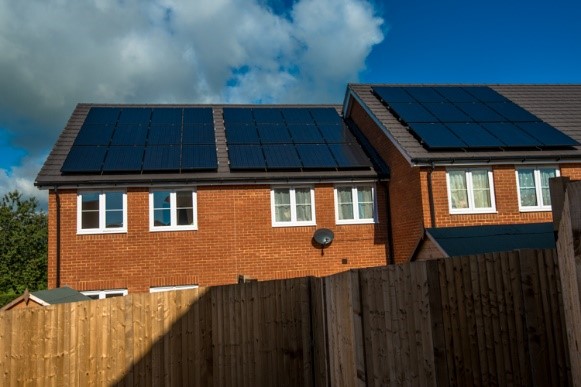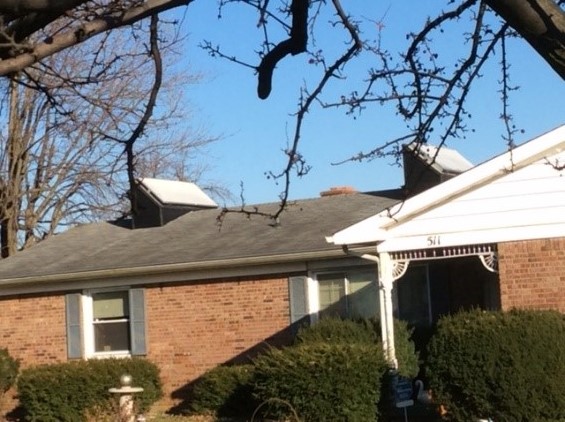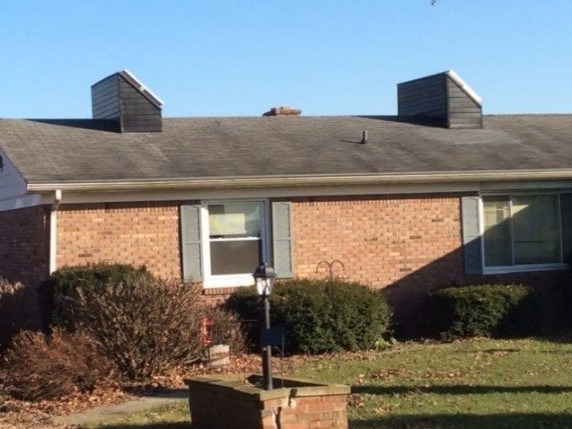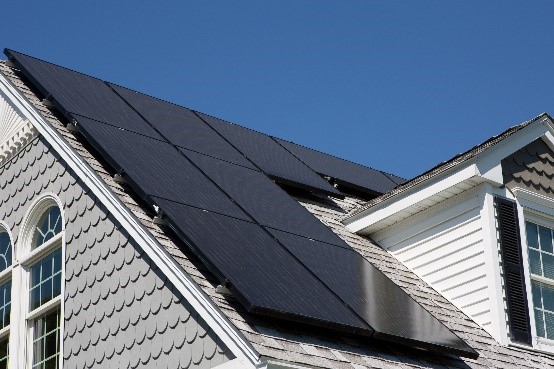These are solar electric or photovoltaic (PV) panels.
Please ask your Indiana State Senator to vote for SB 207 to fix the HOA solar problem in Indiana introduced by Sen. Aaron Freeman (R-Indianapolis).
Indiana State Senator Aaron Freeman (R-Indianapolis)
SB 207 DIGEST
Frequently Asked Questions and Answers on SB 207 and the Homeowner Association (HOA) Solar Problem in Indiana
Q: What is the HOA solar problem in Indiana?
A: There are HOAs which either 1) prohibit homeowners from installing solar or 2) unreasonably restrict a homeowner from installing a solar energy system. See this Indianapolis Star article – https://www.indystar.com/story/news/2018/01/18/hoas-rain-homeowners-solar-parade-residents-property-rights/1024741001/.
Q: Doesn’t SB 207 interfere with existing private contracts (HOA covenants)?
A: No. The bill is prospective and only affects HOA governing documents that become effective after June 30, 2018. We do hope the passage of SB 207 will encourage HOAs to voluntarily change existing covenants which prohibit solar as well. Additionally, this bill is not meant to curtail the authority of HOAs. Rather, the goal is to provide objective guidance for evaluating solar panel requests that is sorely lacking in too many HOA covenants throughout Indiana.
Q: But I didn’t think an HOA could prohibit solar because there is a state solar rights law?
A: No, not as it pertains to HOAs and solar. Indiana Code (IC) 36-7-2-8 states, in part:
IC 36-7-2-8 Solar energy systems; ordinances; reasonable restrictions
(b) A unit [see definition below] may not adopt any ordinance which has the effect of prohibiting or of unreasonably restricting the use of solar energy systems other than for the preservation or protection of the public health and safety.
(c) This section does not apply to ordinances which impose reasonable restrictions on solar energy systems. However, it is the policy of this state to promote and encourage the use of solar energy systems and to remove obstacles to their use. Reasonable restrictions on solar energy systems are those restrictions which:
(1) do not significantly increase the cost of the system or significantly decrease its efficiency; or
(2) allow for an alternative system of comparable cost and efficiency.
IC 36-1-2-23 "Unit"
Sec. 23. "Unit" means county, municipality, or township.
Therefore, this statute does not apply to HOAs, which is why SB 207 is needed in statute.
Q: But I thought solar panels hurt property values?
A: Actually, it’s just the opposite – solar panels increase property values, as evidenced by the January 13, 2015 study, “Selling Into the Sun: Price Premium Analysis of a Multi-State Dataset of Solar Homes,” conducted by the Lawrence Berkeley National Laboratory (see full study at https://emp.lbl.gov/sites/default/files/lbnl-6942e.pdf). The study states, in part:
“We find that home buyers are consistently willing to pay PV [solar photovoltaic] home premiums across various states, housing and PV markets, and home types; average premiums across the full sample equate to approximately $4/W [Watt] or $15,000 for an average-sized 3.6-kW [kilowatt] PV system.”
Also, other studies have found that when people see solar on a home, it makes them then want to go solar themselves. Solar panels on homes tend to attract people to those neighborhoods and solar panels increase the sustainability of one’s home.
Q: Isn’t there another way to fix this problem, such as circulating a petition around your neighborhood?
A: In Indiana, HOA covenants can require up to 75% support to amend. If you live in a neighborhood that bans or otherwise unreasonably restricts solar and you have hundreds of homes, that can be extremely burdensome and costly. One such homeowner experiencing an HOA solar problem in Westfield lives in a neighborhood of approximately 1,200 homes and the threshold to amend the covenants is 75%, meaning he would have to get at least 900 homeowners to support him. Additionally, HOA bylaws may call for the petition to be created by an “attorney-in-fact,” meaning you would need to have at least a limited Power of Attorney and each signature would need to be notarized.
Q: But aren’t solar panels ugly?
A: That’s subjective and depends on one’s perception. This is in the eye of the beholder. First, we need to differentiate between the language typically found in HOA covenants, particularly “solar heat panels” and “solar photovoltaic (PV) panels.”
- Many HOA covenants today ban “solar heat panels,” which is an obsolete technology that was used many years ago to heat homes using solar power. These panels were somewhat bulky and raised far off the roof, as shown in the below photographs.
Pictures of solar heat panels
- Solar PV panels, which are used to produce electricity, are flush-mounted parallel to a roof and only raised a few inches off the roof. Additionally, the wiring is kept neatly tucked away to minimize view and many solar panels today are made with a non-glare surface, as to not blind people, including pilots flying commercial airplanes. Also, solar PV panels can now be installed in one color, instead of having a black or blue panel and silver trim.
Pictures of solar PV panels
Q: Okay, but what about Tesla’s solar shingles? Wouldn’t that look better?
A: The Tesla solar shingles, known as the Solar Roof, are not yet available in Indiana and won’t be until 2019. Also, the Solar Roof is very, very expensive. One homeowner, whose solar PV system cost $28,800, found that Tesla estimated for their home, the Solar Roof would cost over $59,000! And coupling that with Indiana’s low electric rates, the payback was over 35 years. Even the Tesla representative advised the homeowner that because of Indiana’s low rates, the Solar Roof would not make economic sense at this time.
The cost of solar PV panels is rapidly dropping and it is unknown at this time how long it will take the Solar Roof to become cost competitive.
Q: What are the other reasons this legislation is needed in Indiana?
A: Here are other reasons:
- Energy freedom and choice; less reliance on the grid.
- The ability to take personal responsibility for one’s own energy future.
- Purchasing a solar energy system allows you to hedge future increases in electric utility costs.
If you contact your state senator about supporting SB 207, please let us know what they say. Send an email to: Laura.Arnold@IndianaDG.net. Thanks!






